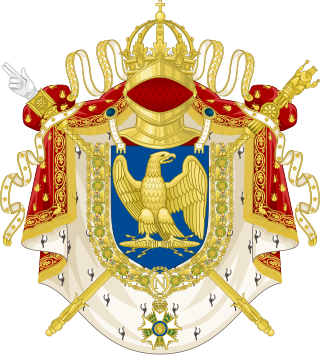Top Qs
Timeline
Chat
Perspective
Emperor of the French
Monarchical title of Napoleon I to III From Wikipedia, the free encyclopedia
Remove ads
Emperor of the French (French: Empereur des Français) was the title of the monarch and supreme ruler of the First French Empire and the Second French Empire. The emperor of France was an absolute monarch.
Remove ads
Details
Summarize
Perspective

After rising to power by the Coup of 18 Brumaire in 1799 and ending the French Revolution, Napoleon Bonaparte was proclaimed Emperor on 18 May 1804 by the Senate and was crowned Emperor of the French on 2 December 1804 at the cathedral of Notre-Dame de Paris, in Paris, with the Crown of Napoleon.[1]
The title of "Emperor of the French" was also supposed to demonstrate that Napoleon's coronation was not a restoration of the monarchy, but an introduction of a new political system: the French Empire. The title emphasized that the emperor governed over "the French people" (the nation) with their consent, did not rule over France (the state), and was an office under the French Republic similar to the previous office of First Consul. The old formula of "King of France" indicated that the king owned France as a personal possession. The new term indicated a constitutional monarchy.[2] The title was purposely created to preserve the appearance of the French Republic and to show that after the French Revolution, the feudal system was abandoned and a nation state was created, with equal citizens governed by their emperor. "Emperor" also harkened back to the Roman Republic title of Imperator, as a magistrate who exercised Imperium or command, especially over an army. This emphasized Napoleon as Chief Magistrate and Commander-in-Chief elected by the citizens.
Taking the title "emperor" also emphasized that the will of the citizens of France was equal in sovereignty to anyone's, especially to what had been until this time the highest sovereignty in the Western world: the (Holy) Roman Emperor, who claimed continuity with the ancient Roman Emperors, and whose coronation by the Pope was used to claim authority by divine right.
It was only after 1 January 1809 that the state was officially referred to as the French Empire and not the French Republic.[3]
Napoleon's reign lasted until 22 June 1815, when he was defeated at the Battle of Waterloo, exiled, and imprisoned on the island of Saint Helena, where he died on 5 May 1821. His reign was interrupted by the Bourbon Restoration of 1814 and his exile to Elba, from where he escaped less than a year later to reclaim the throne, reigning as Emperor for another 111 days before his final defeat and exile.
Less than a year after the 1851 French coup d'état by Napoleon's nephew Louis-Napoléon Bonaparte, which ended in the successful dissolution of the French National Assembly, the French Second Republic was transformed into the Second French Empire, established by a referendum on 7 November 1852. President Bonaparte, elected by the French people, officially became Napoleon III, Emperor of the French, from the symbolic and historic date of 2 December 1852. His rule would de facto end on 28 July 1870 - the power of the head of state was transferred to his wife Eugenie de Montijo who would rule as empress regent of France while Napoleon III left with his army. His reign would nominally continue until 4 September 1870, as he was officially deposed after his defeat and capture at the Battle of Sedan during the Franco-Prussian War. In March 1871, he would be released from Prussian custody and exiled to Chislehurst, United Kingdom, where he died on 9 January 1873.
Since the death of Napoleon III's only son, Louis-Napoléon in 1879, the House of Bonaparte has had a number of claimants to the French throne. The current claimant is Charles, Prince Napoléon, who became head of the House of Bonaparte on 3 May 1997. His position is challenged by his son, Jean-Christophe, Prince Napoléon, who was named as heir in his late grandfather's testament.
Remove ads
Honours
Among the honours Napoleon I instituted or received were:
 First French Empire: Grand Master of the Legion of Honour
First French Empire: Grand Master of the Legion of Honour First French Empire: Grand Master of the Order of the Reunion
First French Empire: Grand Master of the Order of the Reunion Kingdom of Italy: Grand Master of the Order of the Iron Crown
Kingdom of Italy: Grand Master of the Order of the Iron Crown Austrian Empire: Grand Cross of the Order of St. Stephen, 1810[4]
Austrian Empire: Grand Cross of the Order of St. Stephen, 1810[4] Kingdom of Bavaria: Knight of the Order of St. Hubert, 1805[5]
Kingdom of Bavaria: Knight of the Order of St. Hubert, 1805[5] Kingdom of Denmark: Knight of the Order of the Elephant, 18 May 1808[6]
Kingdom of Denmark: Knight of the Order of the Elephant, 18 May 1808[6] Kingdom of Portugal: Grand Cross of the Sash of the Three Orders, 8 May 1805[7]
Kingdom of Portugal: Grand Cross of the Sash of the Three Orders, 8 May 1805[7] Kingdom of Prussia: Knight of the Order of the Black Eagle, 1805[8]
Kingdom of Prussia: Knight of the Order of the Black Eagle, 1805[8] Russian Empire: Knight of the Order of St. Andrew, July 1807[9]
Russian Empire: Knight of the Order of St. Andrew, July 1807[9] Kingdom of Spain: Knight of the Order of the Golden Fleece, 1805[10]
Kingdom of Spain: Knight of the Order of the Golden Fleece, 1805[10] Kingdom of Sweden: Knight of the Order of the Seraphim, 3 February 1811[11]
Kingdom of Sweden: Knight of the Order of the Seraphim, 3 February 1811[11]
Remove ads
List of emperors
First French Empire
Hundred Days
Regarded as a continuation of the First French Empire despite the brief exile of the Emperor Napoleon I
Second French Empire
See also
References
Wikiwand - on
Seamless Wikipedia browsing. On steroids.
Remove ads





